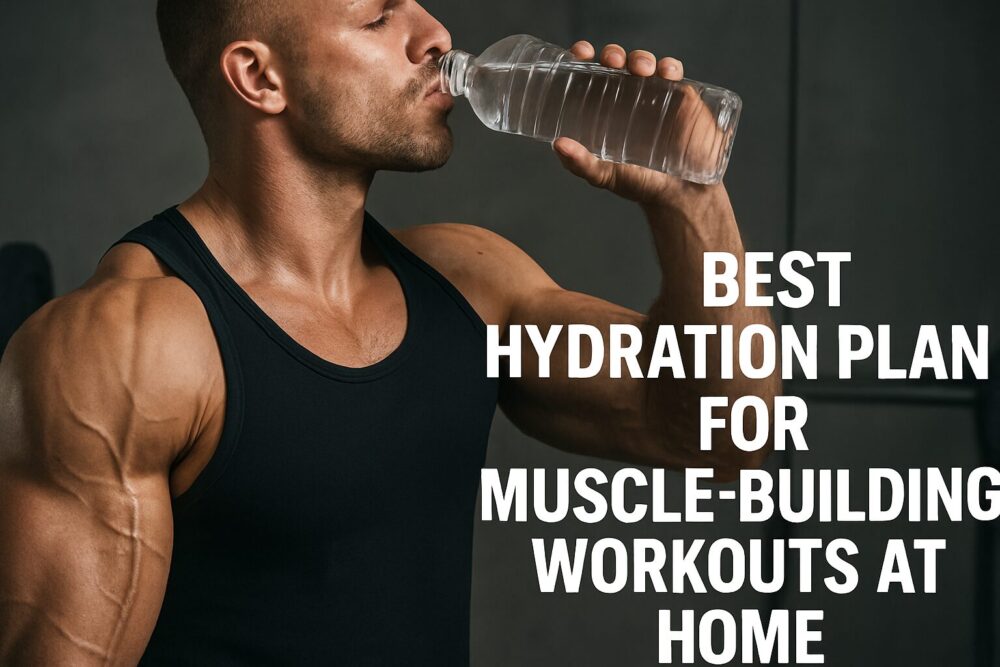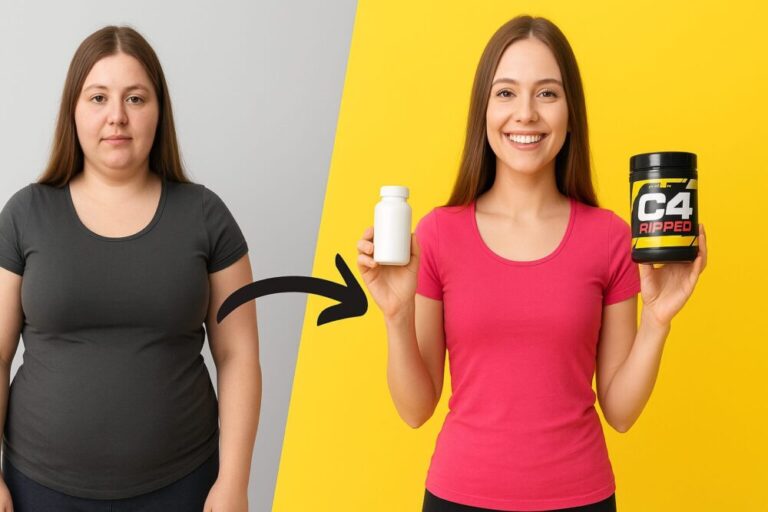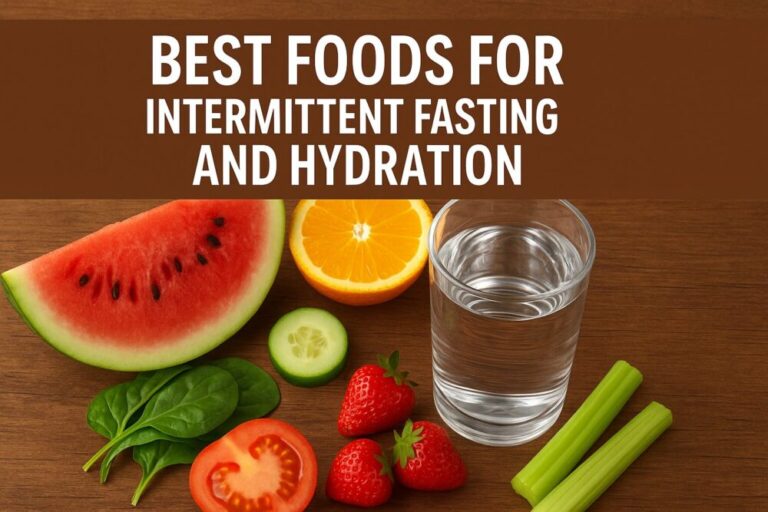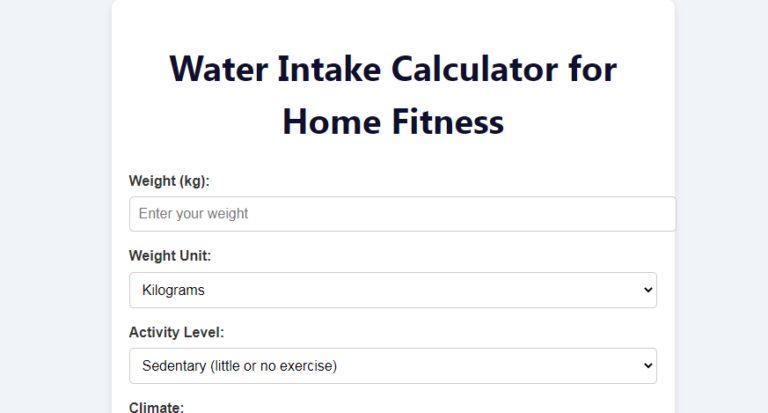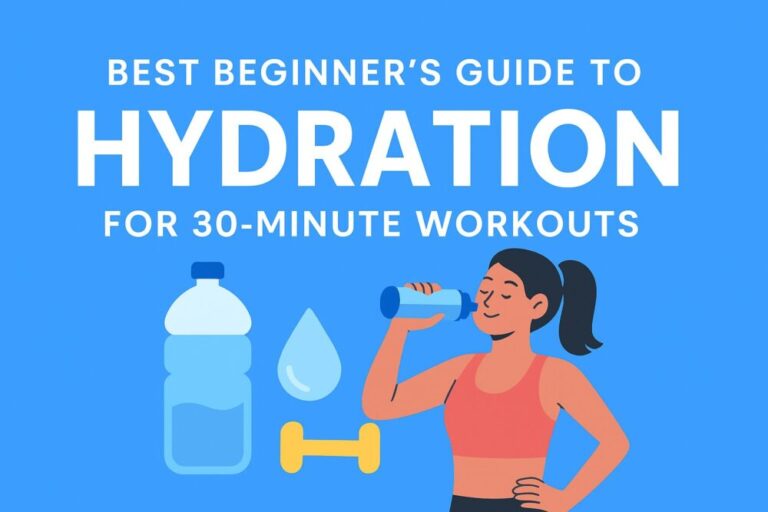Men interested in building muscles at home typically focus on lifting heavier, eating more protein, and tracking calories, yet one key aspect often overlooked: hydration. Water not only satisfies thirst, its benefits extend into strength, endurance, protein synthesis and recovery processes.
Research reveals that even a slight loss of body water can significantly impede physical performance, reduce muscle strength and slow recovery (NCBI Study on Dehydration and Performance). Without the appropriate hydration plan in place, your home workouts won’t produce the results you expect.
In this article, we’ll outline the optimal hydration plan during home muscle-building workouts for men, covering pre-, intra-, and post-workout strategies, electrolytes’ roles within that plan and our Water Intake Calculator to customize your plan specifically to you.
The Hydration Phases for Muscle Growth at Home
This structured hydration plan that covers them before, during, and post workout will help you reach optimal performance and results. Let’s break this down:
1. Pre-Workout Hydration
The pre-workout hydration process begins long before you pick up a dumbbell.
- Target 500-600ml (16-20oz) of water two hours prior to training.
- Add another 250-300 ml (8-10 oz) 20 minutes before your workout to ensure optimal hydration levels during exercise.
- Avoid becoming dehydrated–dark urine and dizziness are telltale signs.
This will ensure that your muscles will receive all the hydration they require in order to cope with stress more easily.
If you’re just getting started in fitness and need an easy guide on hydration for 30-Minute Workouts? Check out the Beginner’s Guide to Hydration for 30-Minute Workouts for tips that work for shorter regimens.
2. Hydration during Workouts
When lifting at home in cramped spaces with minimal ventilation, sweat loss can quickly increase. For optimal workout results, it is essential that hydration occurs throughout the exercise session – particularly for home training programs conducted in smaller spaces with reduced ventilation.
- Consume 200-300 ml (7-10 oz) every 10–20 minutes.
- For workouts that last 60 minutes or longer and in hot conditions, electrolytes may provide essential hydration support.
- Sip consistently rather than drinking in large volumes at once.
Hydrating during workouts not only prevents fatigue but also maintains muscle pump, endurance, and focus.
3. Post-Workout Hydration
Perhaps one of the most overlooked but critical steps, post-workout hydration restores fluid balance, speeds recovery of muscles and decreases soreness.
- Replenishing 16-24 oz of bodyweight lost during training is important.
- Add electrolytes if you sweat excessively.
- Combine protein and carbs for maximum nutrition absorption.
Recovering from workouts can be challenging when time is scarce. Our post, on Best Hydration Tips for Busy Moms Doing Home Workouts, provides practical strategies you can borrow even if you aren’t a mom!
Adjust Your Hydration Based on Sweat Rate
Every man’s water needs differ based on muscle mass, workout intensity, room temperature and other factors that impact his level of perspiration. Men with different sweat rates require different amounts of hydration each day. These factors may alter how much water they require each day.
Here’s how you can customize it manually:
- Prior and after an exercise session, make sure you weigh yourself.
- Drink 500-750ml (16-24oz). For every 0.5 kg (1lb) you shed, consume between 500 and 750 ml (16-24oz).
- Track trends over multiple sessions to adjust your baseline hydration plan.
This method is especially advantageous for athletes training at home in hot or poorly ventilated environments.
Alternative: If you prefer not to keep track of sweat rate every session, use our Water Intake Calculator instead. It gives an instantaneous personalized daily hydration goal based on your weight, activity level, and fitness goals – without the inconvenience of weighing-in before and after every workout session.
Electrolytes and Muscle-Building Workouts
Water is only part of the hydration equation. Electrolytes, sodium, potassium, magnesium, and calcium play a critical role in muscle function and hydration balance.
- Sodium helps retain fluids and prevent cramping.
- Potassium & Magnesium support muscle contractions.
- Calcium is essential for strength and bone support.
For sessions under an hour, water alone is enough. But for intense, sweat-heavy workouts, a simple electrolyte drink (or even coconut water with a pinch of salt) can make a big difference.
Tracking and Monitoring Your Hydration
Staying properly hydrated after an athletic endeavor doesn’t end, be consistent by tracking and monitoring hydration at home! For optimal performance:
- Add reminders or download a hydration app.
- Check your urine color (light yellow means that you are adequately hydrated).
- Keep a reusable water bottle on hand at all times.
Use our Water intake Calculator for an effortless approach. It takes into account your weight, training schedule and activity level, so there’s no guessing involved!
Advanced Hydration Strategies for Muscle-Building at Home
Once you’ve mastered the basic hydration rules of drinking enough water before, during, and after your workouts, advanced hydration strategies can take your results even further. These advanced strategies help optimize nutrient absorption, muscle recovery, and performance during muscle-building workouts at home.
1. Timing Hydration with Meals
Taking in water during physical activities involves how we combine drinking with food throughout the day. Drinking water with meals can:
- Improve nutrient absorption by improving digestion and helping dissolve vitamins and minerals.
- Enhance muscle protein synthesis when combined with protein-rich meals by increasing the efficiency with which amino acids reach your muscles.
- Reducing bloat by taking small sips of water at regular intervals.
2. Combining BCAAs with Fluids
Branch Chain Amino Acids (BCAAs), such as leucine, isoleucine and valine are well-known for assisting muscle recovery; when mixed with fluids they offer both hydration and recovery.
- Leucine stimulates muscle protein synthesis, an essential element for growth.
- Isolocine and valine can help minimize fatigue during intensive strength sessions.
- Consuming BCAAs during or immediately following your workout ensures they will be quickly absorbed by your body.
Tip: As an intra or post workout hydration option, mix 5–10 grams of BCAAs with 400–600 milliliters of water to provide you with intra and post-workout hydration that will keep you hydrated while providing your muscles with building blocks they require for growth and repair. This combo ensures both intra and post workout recovery is optimized!
3. Cold Water Immersion Post-Training
While not exactly “drinking,” cold-water immersion (CWI) has gained increasing attention among athletes as an effective hydration-support strategy post-training sessions. By submerging yourself in cold water after intense sessions, CWI can:
- Reduce sweat-induced fluid loss by rapidly cooling down your body.
- Lower inflammation and muscle soreness to speed recovery.
- Support fluid balance by limiting further fluid loss.
Studies published in Journal of Physiology indicate that CWI can help regulate plasma volume and assist with restoring hydration balance faster after strenuous workouts .
Putting It All Together
By combining smart hydration timing, functional supplements like BCAAs, and recovery practices such as cold-water immersion, men training at home can optimize both muscle-building results and overall recovery.
If you want to explore hydration strategies for all fitness levels in greater depth, The Ultimate Guide to Hydration provides an essential resource for understanding its role in performance, recovery and everyday health.
FAQs
Is plain water enough for hydration during strength training?
For workouts under 60 minutes, plain water is usually sufficient. But if your home muscle-building session lasts longer, or you sweat heavily, you should add electrolytes like sodium, potassium, and magnesium to prevent cramps and support muscle contractions.
What’s the best way to track hydration at home?
Two simple methods are:
Urine color test – Pale yellow means hydrated, dark indicates dehydration.
Body weight before and after workouts – Replace 1.5x the fluid lost in sweat.
For accuracy, combine these with a personalized calculator to set your daily hydration target.
Can coffee or pre-workout drinks count toward hydration?
Yes, beverages like coffee, tea, and pre-workouts still contribute to hydration. However, because of their caffeine content, they may have a mild diuretic effect if consumed in high amounts. For best results, use them in moderation and don’t replace your primary water intake with stimulants.
Conclusion
The best hydration plan during home muscle-building workouts for men is structured, personalized, and consistent. By focusing on pre-, intra-, and post-workout hydration, monitoring sweat loss, and including electrolytes when needed, you can boost muscle growth, performance, and recovery.
Don’t leave your gains to chance, use our Water Intake Calculator to create your personalized hydration strategy today.
Your muscles will thank you.

